|
|
|
Sort Order |
|
|
|
Items / Page
|
|
|
|
|
|
|
| Srl | Item |
| 1 |
ID:
166807


|
|
|
|
|
| Summary/Abstract |
This article analyzes and compares four results of public opinion surveys conducted through the coordination of academic institutions in Thailand's Deep South. Based on the concepts of the conflict transformation, the study indicates, in the survey data conducted from 2015 to 2017, that people in the Deep South have had mixed feelings about the ongoing peace talks and the violent situation. The more open form of autonomous governance has been advocated by a sizable number of people, but the spiral of silence dominating the “no comment” groups still makes it problematic to predict the future. More studies need to be done and the article also shows that the survey research, if carried out properly, could reveal the unseen drivers of change in the conflict society.
|
|
|
|
|
|
|
|
|
|
|
|
|
|
|
|
| 2 |
ID:
140875
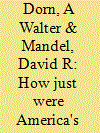

|
|
|
|
|
| Summary/Abstract |
To what degree were the wars waged by the United States ethically just? The answer is necessarily subjective, but would experts from across the political spectrum score conflicts in a similar fashion? In a survey of more than 100 international studies experts, the 18 major conflicts fought by the United States since 1900 were assessed. World War II was rated as the most just, whereas the Iraq Invasion was considered the most unjust. Respondents also scored each conflict under seven just war criteria: just cause, right intent, net benefit, legitimate authority, last resort, proportionality of means, and right conduct. The average of the criteria, the “Just War Index” (JWI), correlated strongly with the participants' measure of each conflict's overall justness, indicating the importance of the criteria. Participants who identified themselves on the political right gave higher JWI values for almost all conflicts than those on the left. The left rated seven conflicts unjust while the right found all to be just, though three only slightly so. Nonetheless, the ranking of conflicts was quite similar between the two groups. Though no conflict was deemed completely just or unjust, the US war spectrum ranged from highly “just” to highly “unjust.” The JWI approach offers a quantified and nuanced analysis of important ethical criteria—an approach that could be applied to other conflicts, including future ones.
|
|
|
|
|
|
|
|
|
|
|
|
|
|
|
|
| 3 |
ID:
171277


|
|
|
|
|
| Summary/Abstract |
Data quality in survey research remains a paramount concern for those studying mass political behavior. Because surveys are conducted in increasingly diverse contexts around the world, ensuring that best practices are followed becomes ever more important to the field of political science. Bringing together insights from surveys conducted in more than 80 countries worldwide, this article highlights common challenges faced in survey research and outlines steps that researchers can take to improve the quality of survey data. Importantly, the article demonstrates that with the investment of the necessary time and resources, it is possible to carry out high-quality survey research even in challenging environments in which survey research is not well established.
|
|
|
|
|
|
|
|
|
|
|
|
|
|
|
|
| 4 |
ID:
167348
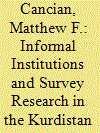

|
|
|
| 5 |
ID:
120746
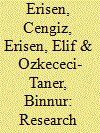

|
|
|
|
|
| Publication |
2013.
|
| Summary/Abstract |
Given the interdisciplinary nature of political psychology research, the methods employed to produce scientific knowledge should be able to answer the questions raised in the discipline. The multitude of methods used in political psychology offers a variety of options for those interested in conducting research in political science. This article explains the basic structure of experimental design, survey research, and content analysis and briefly discusses the recent developments and interest growing on certain methods in the discipline. Each method is discussed in detail to the extent that would be sufficient to understand what one could achieve by using it.
|
|
|
|
|
|
|
|
|
|
|
|
|
|
|
|
| 6 |
ID:
158101
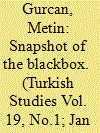

|
|
|
|
|
| Summary/Abstract |
This paper aims at opening the blackbox of the Turkish military by presenting the findings of a survey conducted among 1401 officers in May–August 2015. The findings, which could be defined as the snapshot of the Turkish military’s officer corps views, show that, as the ranks decrease, there are some major trends influencing the officer corps. These include heterogenization and diversification of opinions from collectivist to an individualist understanding of life, from an elitist to an egalitarian view of society, and change from value-centric service to a focus on financial goals and career opportunities. The findings also indicate that the Turkish Army, Air Force and Navy’s organizational cultures are dissimilar regarding their stance towards military transformation, organizational restructuring and some socio-political issues such as the extent of secularist sentiment, religiosity and political orientations.
|
|
|
|
|
|
|
|
|
|
|
|
|
|
|
|
| 7 |
ID:
178583
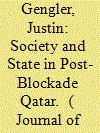

|
|
|
|
|
| Summary/Abstract |
This article examines key questions of citizen-state, citizen-citizen, and citizen-expatriate relations in the Arab Gulf states through the lens of the 2017 Qatar blockade. It utilizes original public opinion survey data that allow examination of the embargo’s short-term impacts on social and political relations in Qatar as well as broader trends observed over the period from 2010 to 2019. Results lend support to some existing qualitative accounts suggesting changes in important social and political dynamics in Qatar after the blockade. However, survey data also show that such post-blockade differences are mostly reflections of larger attitudinal shifts witnessed over the course of the past decade, rather than isolated effects of the GCC crisis. This suggests the possibility that other Gulf Arab states are experiencing similar transformations in popular sociopolitical orientations and behavior brought on by the same long-term drivers.
|
|
|
|
|
|
|
|
|
|
|
|
|
|
|
|
| 8 |
ID:
160323
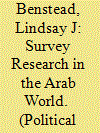

|
|
|
|
|
| Summary/Abstract |
Survey research has expanded in the Arab world since the 1980s. The Arab Spring marked a watershed when surveying became possible in Tunisia and Libya, and researchers added additional questions needed to answer theoretical and policy questions. Almost every Arab country now is included in the Arab Barometer or World Values Survey. Yet, some scholars express the view that the Arab survey context is more challenging than that of other regions or that respondents will not answer honestly, due to authoritarianism. I argue that this position reflects biases that assume “Arab exceptionalism” more than fair and objective assessments of data quality. Based on cross-national data analysis, I found evidence of systematically missing data in all regions and political regimes globally. These challenges and the increasing openness of some Arab countries to survey research should spur studies on the data-collection process in the Middle East and beyond.
|
|
|
|
|
|
|
|
|
|
|
|
|
|
|
|
|
|
|
|
|